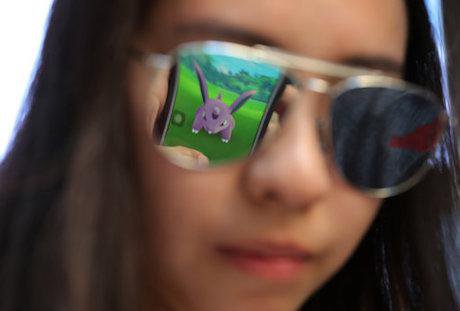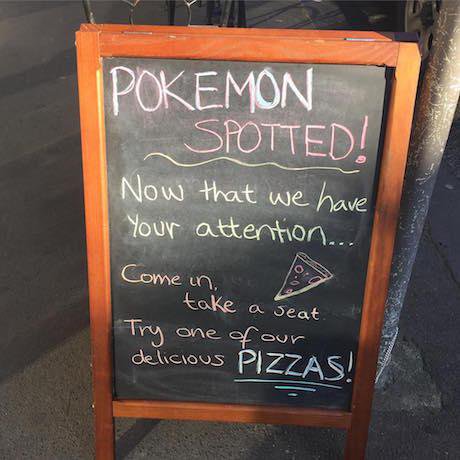
The Pokémon Go game reflected in a player’s sunglasses. Credit: Kin Cheung/AP/Press Association Images. All rights reserved.In the days after Pokémon Go was released on mobile iOS and Android devices in Australia last month, the State Library of Victoria became a major draw for players of the augmented reality game. I watched as a crowd gathered: there were primary school children, but also many groups of young adults, both staring at their individual screens as well as chatting and laughing together.
What attracts people to Pokémon Go? While some of the demographic are new to the Pokémon franchise, others see it as a nostalgic return to the game-playing of their childhood. Then there are the ones who may not be so interested in the cute monsters, but want to stay on top of what’s trending. In all of these cases, the draw to players is a new kind of interface between public space and the imagination.
The draw to players is a new kind of interface between public space and the imagination.
My family is also playing Pokémon Go, and like others, we are using my son’s account on a few different devices to maximise our ‘experience points’ and to ‘incubate eggs’ through the combined distances we have walked. We spin at ‘Pokéstops’ to receive supplies such as the familiar red, black and white ‘Pokéballs’ used to capture creatures.
Pokéstops may also yield ‘incense’ to lure Pokémon out of hiding, ‘lucky eggs’ to accelerate ‘leveling up’, and ‘razz berries’ to augment players’ power to capture a Pokémon. In our neighbourhood, these are mostly landmarks such as street art, churches, public places like swimming pools and memorials. Marked as a Pokéstop, we see familiar places around us in a new way; maybe a piece of graffiti that we passed obliviously merits a closer look.
On the other hand, perhaps we are drawn to shops which we previously had no interest in. So savvy players need to be aware of the potential for third-party commercial interests.
Scattered between the Pokéstops are ‘gyms’; these are sites that one can only access after attaining level five, and choosing to identify as a member of one of three colour-coded teams. At the gyms, players represent their team while facing off with others. Through repeated battles with the opposition, a player can ‘take a gym’ for their team.

Shops cash in on the Pokémon Go phenomenon. Credit: AcademyLane/Instagram. All rights reserved.I asked my son more about these teams: blue (the most popular), red and yellow. These colours represent ‘legendary’ Pokémon that no one can capture. My son, ever cynical at 13, told me that the teams were basically meaningless. Even though teams are supposed to encourage players to work together, he exclaimed: “they just separate people…with no benefits!”
This enforced separation of players is an interesting aspect of the game, demonstrating how virtual boundaries are played out ‘in real life’.
One example of this took place last month in Japan: a group of Chinese Pokémon Go players, using a faked GPS location (as the game is not yet available in China), invaded Japanese servers. They managed to take over a Gym located at the Yasukuni Shrine in Tokyo, the infamous state-sponsored memorial to the Japanese war dead, using a powerful and rare Pokémon called Dragonite, which they nicknamed “Long live China”. Many Pokémon battles ensued, involving creatures with both Chinese and Japanese names.
At first glance, this seems a clear expression of the simmering nationalist resentment between the two former enemies, but other observers said it was merely an innocent outcome of Chinese gamers’ desire to play beyond their country's "Great Firewall". In this sense, Pokémon battles are both richly symbolic and totally meaningless, depending on the players’ and the observers’ personal motives, values and priorities.
Pokémon battles are both richly symbolic and totally meaningless.
When I think about this international virtual gaming incident, and watch players around us in familiar spaces made new by spinning Pokéstops, towering Gyms and alluring magical creatures, I’m reminded of the work of French philosopher Jean Baudrillard and his concerns about today’s hyper-mediated society.
Baudrillard coined the phrase “the map precedes the territory” to express the idea that our knowledge of the representation of space (the map) is often more familiar and more ‘real’ to us than the actual space itself. Accordingly, as the media increasingly filters information and experience for us, Baudrillard suggests that ‘authentic’ reality will no longer exist; everything around us will become a reflected construction.
Pokémon Go is certainly a reflected construction of our geographic and ludic reality. It has reframed the most mundane and familiar landscape in an abstract, blue and green background, filled with the potential for battles and victories. ‘Real’ places now have ‘unreal’ meaning, while some places’ ‘real’ meaning may be discarded as the game re-frames the landscape as new.
Whatever one’s interpretation of these new desires, we should not dismiss Pokémon Go as another socially isolating video game. Pokémon-desires link players to others, perhaps not so much through the weakly organised teams, but certainly via collaborative playing and intense strategic discussions between users. Despite Baudrillard’s cynicism about the primacy of the ‘map’ taking with it the loss of the territory’s primacy, Pokémon Go has recreated a map which draws us to a familiar yet new ‘territory’.
As a parent and an observer, it’s my hope that my son plays with care and self-awareness, but given the passivity of the current trend of ‘Netflix and Chill’, I guess I would rather he ‘Pokémon and Go’.
Read more
Get our weekly email
Comments
We encourage anyone to comment, please consult the oD commenting guidelines if you have any questions.